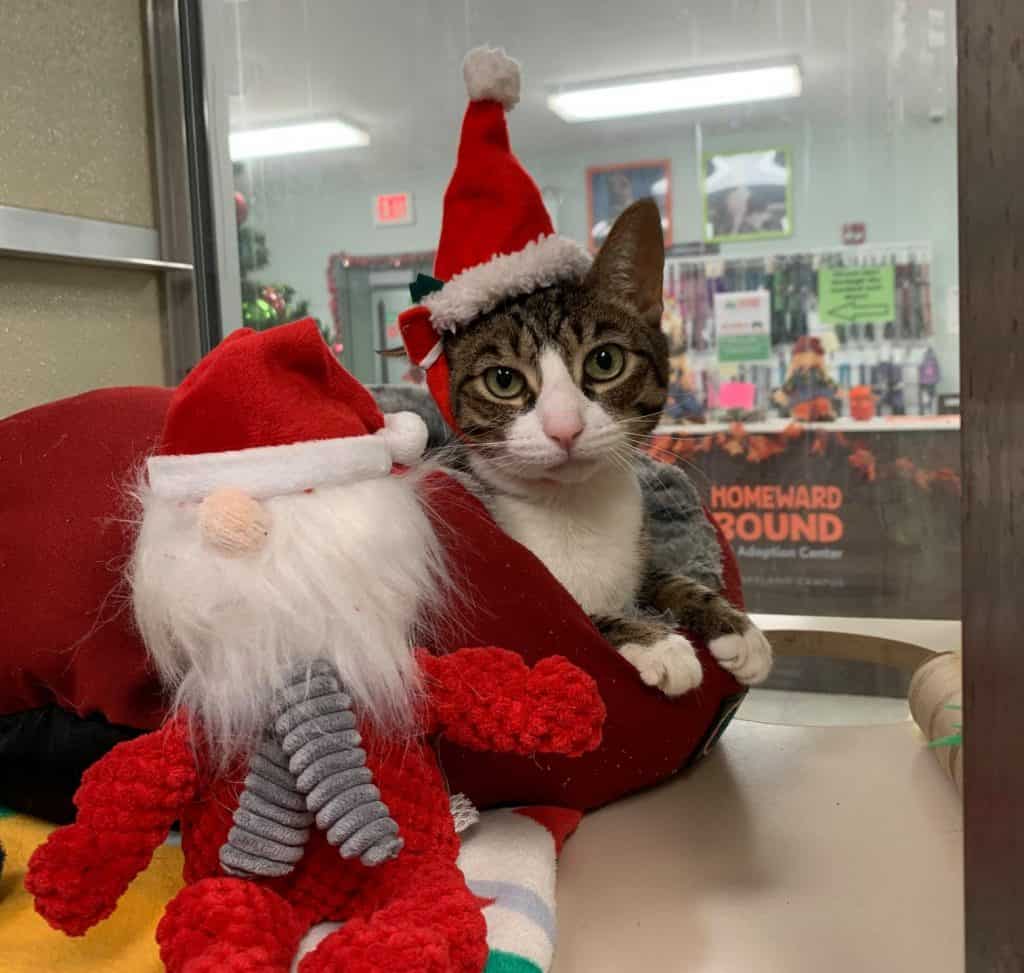

The holidays often mean decorations, festive plants in the house and lots of bright lights and candles.
While all these things may bring smiles and holiday cheer, they could also cause hazardous situations for four-legged family members.
“The most important thing during the holidays is to keep your pets safe,” said Diane Gorgy, treasurer of One Love Animal Rescue. “Everyone wants their dog and cats to be happy and part of the festivities, but you always have to be aware of where they are and what they are doing.”
Christmas trees can be a danger. Pet owners should know a tree’s tiny needles can cause big problems for both dogs and cats.
“People who get real christmas trees, especially of the pine variety, are incredibly dangerous for cats and dogs,” explained Gina DiMarco, director of development for Homeward Bound Pet Adoption Center.
“The pine or fir needles themselves can cause swelling from mouth injuries (and) throat injuries because they are sharp and thick,” she added. “It can also cause vomiting and diarrhea from the oils in it.”
As for a tree’s decorations, cats tend to want to play with tinsel and garland because they’re shiny and colorful. But cats are also known to swallow the festive decorations, causing internal blockages.
“Believe it or not, cats like to play with tinsel,” DiMarco noted. “They think, oh fun, shiny things, let me try to eat it. That will get tangled up in their intestines and that is absolutely, 120 percent a trip to the emergency room.”
Gloucester County Freeholder Director Robert M. Damminger urges residents to make sure their tree is securely anchored to avoid falls with broken ornaments and spilled water. According to DiMarco, dogs are also known to chew on the electric wires attached to tree lights. She also has her own suggestion for keeping pets away from Christmas trees.
“The thing that we try to tell all new families to do is get a baby gate and place the baby gate around the tree,” she said.
Candles are another hazardous item that tend to make their way onto tables and shelves in every household.
“I have seen cats try to swat at them, or if they jump up onto the coffee table, to try and play with something else. And they wave their tail over it and set their tails on fire,” DiMarco warned.
DiMarco also has suggestions for owners to gift their pets. Rawhide bones are extremely dangerous to dogs because they’re bleached and dyed with harmful chemicals. Broken pieces of animal toys can also cause blockages in a pet’s intestinal tract.
With gifts and presents comes lots of trash.The sparkly wrapping paper may not seem like a threat when it’s balled up and thrown in a bin, but when you pour leftover meals on top of it, pets will try their best to dig it out.
“People give boxes with cookies or cheese and sausage,” Gorgy said. “A lot of wrappings can be left around, and if pets think the wrapping smells interesting, that could cause intestinal obstruction when eaten.”
While some dog treats can cause an upset stomach, human treats can, too. Many holiday treats are sweetened with xylitol, which could cause pain and diarrhea. If animals ingest too much, they could die.
“Pet’s cries for your holiday cookies and goodies can be hard to ignore, but doing so can save them from being uncomfortable after indulging,” Damminger warned. “Pets can enjoy the holidays without a visit to the vet, so say no to human foods for their own good.”
The season’s colder temperatures, much like the dangers of hot asphalt during the summer, can pose risks.
“If the ground is damp, there is always a chance for frost,” DiMarco offered. “You don’t want your pets’ pads to stick to anything that could cause problems for them. There are cute booties you can get for them: It does add to your protection and you want to limit your walks.”
The cold temperatures can also involve harmful chemicals such as those found with road salting and de-icing.
“Don’t let your pet lick their paws when they come in,” Gorgy suggested. “Wash their paws or wipe them down and make sure nothing is on there that they can lick.”
Gorgy also urges pet owners to keep the number for the ASPCA poison control hotline handy: (888) 426-4435.









